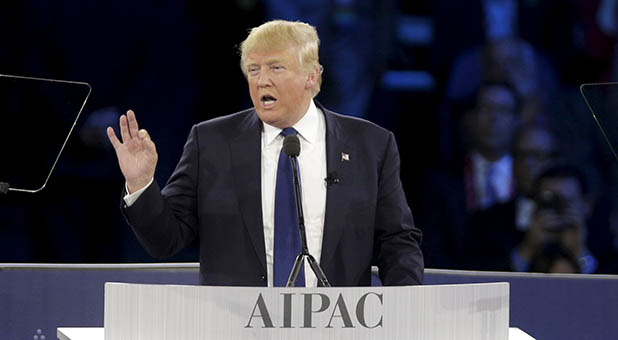Did ‘The Donald’ Trump the Anti-Trump Hype?
A seemingly immeasurable amount of hype leading up to the 2016 American Israel Public Affairs Committee (AIPAC) conference centered on the influential pro-Israel lobby’s invitation of Republican presidential primary front-runner Donald Trump, with a groundswell of Jewish opposition (most prominently in the Reform movement) to Trump’s yet-to-be-delivered AIPAC speech threatening to cast a pall over the massive gathering of nearly 19,000 people.
But this forecasted storm was no more than a passing cloud.
Given the pre-conference controversy surrounding Trump’s speech—with widespread talk of boycotts, protests and walkouts—AIPAC infused its program with pleas for civility. Among an interfaith group of speakers giving brief comments at one general session, Rabbi Leslie Alexander advised the crowd that if presidential candidates take the time to show up in person and describe where they stand on U.S.-Israel relations, “they deserve our respect as one would respect a guest in their own home,” while Rev. Joel Palser said that disrupting a speaker at AIPAC is like “disrupting a sermon in one of our synagogues or churches.”
AIPAC CEO Howard Kohr emphasized that building personal relationships with decision-makers from both parties, and with all major candidates for higher office, is the key to AIPAC’s overriding goal of bolstering the U.S.-Israel relationship. “There are those who question our bipartisan approach to political advocacy,” said Kohr, but “bipartisanship is the only way to create stable, sustainable policy from one election to the next.”
“An invitation is not an endorsement,” said AIPAC Vice CEO Richard Fishman. “No defense of any speaker or particular view is implied. … If you agree, clap, if you disagree, don’t. No policy position was ever improved by booing.”
Political diversity “is our strength,” argued the new president of AIPAC, Lillian Pinkus.
“We need each other,” she said, channeling the “Come Together” theme of this year’s AIPAC conference. “That is the strength of AIPAC. … We can’t afford the luxury of skepticism about our political system. It’s the only one we’ve got. And too much, way too much, depends on our involvement.”
On Monday, the big speech arrived, and Trump was by and large warmly received by the Verizon Center audience. It may have been AIPAC’s messaging, or perhaps it was Trump’s speech itself, which was short on controversial remarks (by his standards) and high on unabashedly pro-Israel policy positions, breaking from the businessman’s past statements this election season that he would aim to be a “neutral” broker in the Israeli-Palestinian peace process. Either way, the anti-Trump delegation at AIPAC didn’t seem to live up to its pre-speech billing.
The other presidential contenders who spoke at the conference did take their shots at Trump, directly and indirectly.
“We need steady hands. Not a president who said he’s neutral on Monday, pro-Israel on Tuesday and who knows what on Wednesday. … Israel’s security is non-negotiable,” said Democratic candidate Hillary Clinton, who also condemned Trump for encouraging violence, “playing coy” with white supremacists and proposing policies such as a ban on Muslim immigration.
Sen. Ted Cruz (R-Texas), the speaker who followed Trump, immediately targeted Trump’s use of the term “Palestine” in his speech, noting that “Palestine” has not existed since 1948. Cruz proceeded to say he “will not be neutral” on Israel as president and that his administration would “stand unapologetically with the nation of Israel.”
Ohio Gov. John Kasich—who labels himself as a moderate Republican presidential candidate with a “positive message”—said he would “not take the low road to the highest office in the land,” which could have referred to the campaign rhetoric of Trump in particular or the rhetoric of all of Kasich’s opponents.
For his part, Trump was unhinged as usual, calling Clinton a “total disaster” and saying “yay” regarding the fact that it is President Barack Obama’s final year in office. But the AIPAC crowd gave Trump a thunderous standing ovation for his remark on Obama, which was surprising for the pro-Israel lobby’s typically bipartisan crowd. AIPAC itself was surprised—and offended—by the audience reaction, with AIPAC’s Pinkus saying Tuesday that the organization takes “great offense” to both Trump’s rhetoric about Obama and the applause it garnered.
“While we may have policy differences, we deeply respect the office of the president of the United States and our president, Barack Obama,” said Pinkus, whose emotion was palpable.
“There are people in our AIPAC family who were deeply hurt last night,” she said, lamenting that “so many applauded a sentiment that we neither agree with nor condone.”
Yet despite its notable public statement against Trump’s words, AIPAC averted the potential Trump crisis at its conference, and the lobby’s policy of inviting every active presidential candidate regardless of their specific policies was seemingly affirmed. With the reality TV star’s lightning rod campaign making flashy headlines around the country and the world, it took the enduring power of the U.S.-Israel relationship to tame the media firestorm. At least for a day.














































